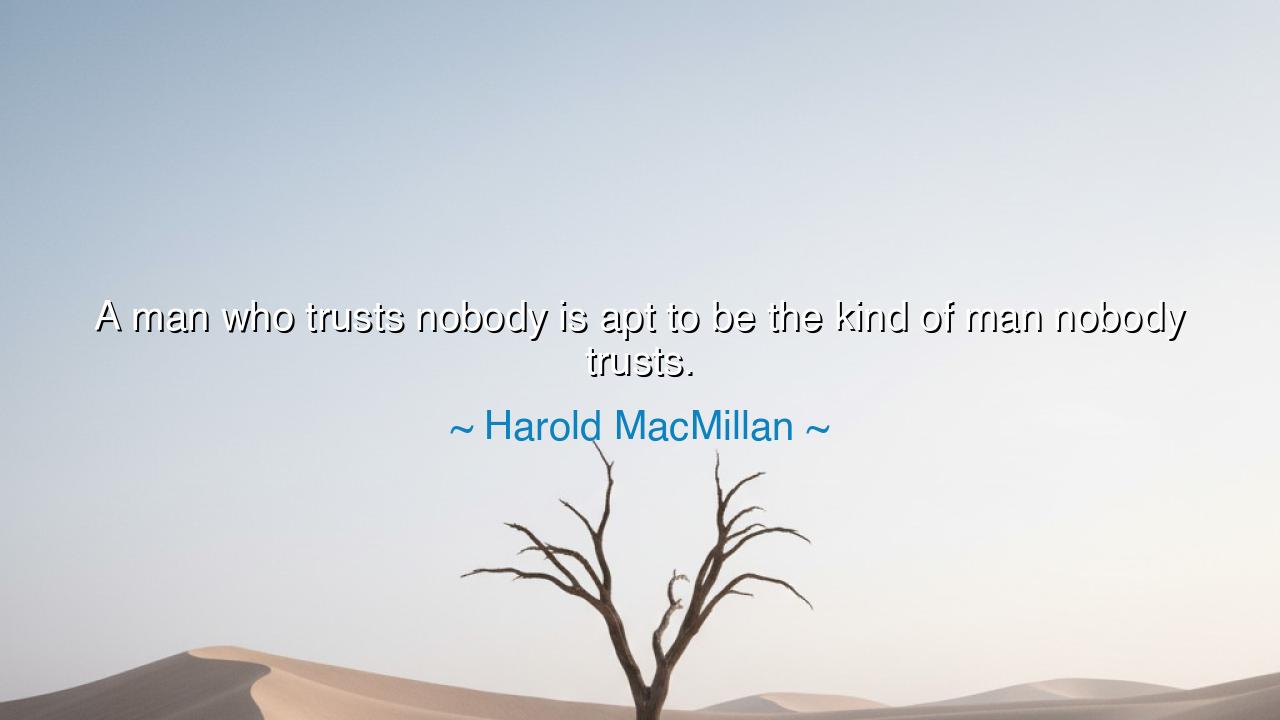
A man who trusts nobody is apt to be the kind of man nobody






Harold MacMillan, a leader forged in the fires of the twentieth century, once uttered words as sharp as any ancient proverb: “A man who trusts nobody is apt to be the kind of man nobody trusts.” In this saying, there echoes the wisdom of ages — that the heart which shuts itself against faith in others becomes a fortress so cold and forbidding that none may enter. To distrust all is to poison the well of human fellowship, for trust is the lifeblood of community, and without it, men wander in suspicion as in a barren wilderness.
The ancients knew that the bonds of friendship, loyalty, and alliance were not founded on might alone, but on mutual confidence. The soldier in the phalanx must trust his brother at his side, or the line will break. The merchant must trust the hand that weighs his goods, else trade withers into suspicion and ruin. The ruler must trust his counselors, else he becomes a tyrant consumed by fear. Thus, to refuse trust entirely is not strength, but weakness; not wisdom, but folly. For the man who sees betrayal in every smile soon reflects only betrayal himself, and others recoil from him as from a serpent.
History offers us the shadow of Joseph Stalin, who, consumed by distrust, surrounded himself with fear rather than loyalty. In his suspicion, he purged allies and generals, silencing any who might oppose him. But what was the fruit of such mistrust? His armies, bled of their wisdom, faltered in the early storms of war, and his people lived in terror rather than devotion. His refusal to trust others made him himself untrustworthy, for trust begets trust, and suspicion begets suspicion. Thus MacMillan’s words are proven true upon the stage of history.
Yet consider also the shining counterexample of Abraham Lincoln. In the midst of civil war, he formed what was called a “team of rivals” — surrounding himself with men who were not only different from him, but who had once opposed him. To some, this seemed folly. Why trust those who had sought your defeat? But Lincoln, with quiet strength, placed faith in their abilities and judgment. And because he trusted, they in turn trusted him, and together they forged unity strong enough to save a fractured nation. His trust was not blind, but wise; not reckless, but courageous.
Therefore, children of wisdom, see the balance: trust is not the abandonment of caution, nor is it the reckless opening of the gates. It is the courage to believe in others, tempered by the clarity of discernment. A man who trusts no one proclaims by his very suspicion that he himself is not to be trusted. But the one who gives trust wisely, and shows himself faithful, becomes a pillar in whom others find strength.
The lesson is clear: do not let fear harden your heart into iron, nor let suspicion corrode the bonds of fellowship. Learn to trust — not all, not without wisdom, but enough to let the current of life flow. Begin with small acts: honor your promises, extend faith to those who have earned it, and let your word be as stone that does not crumble. When you extend trust, you invite trust in return, and in that mutual exchange, communities, families, and nations find their strength.
So let it be written upon your heart: a man who trusts nobody is apt to be the kind of man nobody trusts. But a man who dares to trust, and proves himself worthy of it, becomes the kind of man upon whom the world can lean. And such men — rare, steadfast, and luminous — are the builders of legacies, the guardians of hope, and the ones whose names endure beyond the dust of their age.






AAdministratorAdministrator
Welcome, honored guests. Please leave a comment, we will respond soon